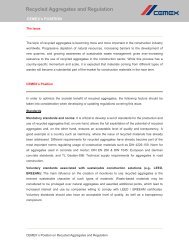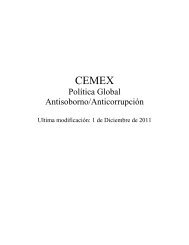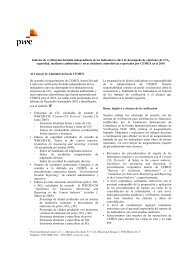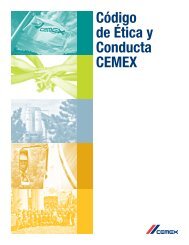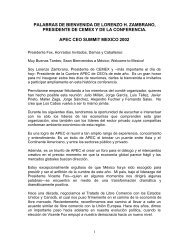building a STRONGER foundation - Cemex
building a STRONGER foundation - Cemex
building a STRONGER foundation - Cemex
You also want an ePaper? Increase the reach of your titles
YUMPU automatically turns print PDFs into web optimized ePapers that Google loves.
As a result of the restrictions under the Financing Agreement and other debt instruments, the current global economic<br />
environment and uncertain market conditions, we may not be able to complete asset divestitures on terms that we find economically<br />
attractive or at all. The current volatility of the credit and capital markets can significantly affect us due to the limited availability of<br />
funds to potential acquiring parties. The lack of acquisition financing in the current economic environment and existing relatively high<br />
levels of indebtedness among many industry peers may likely make it difficult for potential interested acquirers to purchase our assets.<br />
In addition, high levels of consolidation in our industry in some jurisdictions may further limit potential assets sales to interested<br />
parties due to antitrust considerations. Given market conditions at the time of any future asset sales, we can not assure you that we<br />
may not be forced to sell our assets at prices substantially lower than their fair market value.<br />
If we are unable to complete asset divestitures and our cash flow or capital resources prove inadequate, we could face liquidity<br />
problems during 2013 and subsequent years and may not be able to comply with payment obligations under our indebtedness.<br />
We may not be able to realize the expected benefits from acquisitions, some of which may have a material impact on our<br />
business, financial condition and results of operations.<br />
Our ability to realize the expected benefits from acquisitions depends, in large part, on our ability to integrate acquired<br />
operations with our existing operations in a timely and effective manner. These efforts may not be successful. The acquisition of<br />
Rinker substantially increased our exposure in the United States, which has been experiencing a prolonged downturn in the housing<br />
and construction sectors. The downturn in the United States has had adverse effects on our operations in the U.S., making it more<br />
difficult for us to achieve our goal of decreasing our acquisition-related leverage. We also may not be able to achieve all the<br />
anticipated cost savings from the Rinker acquisition. Our financial statements for the year ended December 31, 2008 included noncash<br />
charges of approximately U.S.$1.5 billion for impairment losses in accordance with MFRS, of which approximately U.S.$1.3<br />
billion related to impairment of goodwill (mainly related to the Rinker acquisition). Considering differences in the measurement of<br />
fair value, including the selection of economic variables, as well as the methodology for determining final impairment losses between<br />
MFRS and U.S. GAAP, our preliminary impairment losses in 2008 under U.S. GAAP amounted to approximately U.S.$4.9 billion,<br />
including the impairment losses determined under MFRS, of which approximately U.S.$4.7 billion related to impairment of goodwill.<br />
After finalizing our 2008 impairment exercise under U.S. GAAP during 2009, our impairment losses were reduced by approximately<br />
U.S.$71 million. See note 24 to our consolidated financial statements included elsewhere in this annual report.<br />
During the last quarter of 2010, we performed, under MFRS, our annual goodwill impairment test. Based on this analysis, in<br />
2010, we determined an impairment loss of goodwill for approximately Ps189 million (U.S.$15 million) associated with our reporting<br />
unit in Puerto Rico, which we acquired in July 2002, under MFRS. We did not recognize any additional goodwill impairment losses<br />
under U.S. GAAP for the year ended December 31, 2010. Although we currently are seeking to dispose of assets to reduce our overall<br />
leverage and the Financing Agreement and other debt instruments restrict our ability to acquire assets, we may in the future acquire<br />
new operations and integrate such operations into our existing operations, and some of such acquisitions may have a material impact<br />
on our business, financial condition and results of operations. We cannot assure you that we will be successful in identifying or<br />
acquiring suitable assets in the future. If we fail to achieve the anticipated cost savings from any acquisitions, our business, financial<br />
condition and results of operations would be materially and adversely affected.<br />
As a result of the sale of our operations in Australia, for the year ended December 31, 2009, we recognized a loss on sale, net of<br />
income tax, and the reclassification of foreign currency translation effects accrued in equity and included under “Other comprehensive<br />
income,” for an aggregate amount of approximately Ps5.9 billion (U.S.$446 million). This is reflected in a single line item of<br />
“Discontinued operations.” See note 3B to our consolidated financial statements included elsewhere in this annual report.<br />
Our use of derivative financial instruments has negatively affected our operations especially in volatile and uncertain markets.<br />
We have used, and may continue to use, derivative financial instruments to manage the risk profile associated with interest rates<br />
and currency exposure of our debt, to reduce our financing costs, to access alternative sources of financing and to hedge some of our<br />
financial risks. However, there is no assurance that our use of such instruments will allow us to achieve these objectives due to the<br />
inherent risks in any derivatives transaction. For the years ended December 31, 2008, 2009 and 2010, we had net losses of<br />
approximately Ps15,172 million (U.S.$1.4 billion), Ps2,127 million (U.S.$156 million) and Ps956 million (U.S.$75 million),<br />
respectively, from financial instruments.<br />
The 2008 losses resulted from a variety of factors, including losses related to changes in the fair value of equity derivative<br />
instruments attributable to the generalized decline in price levels in the capital markets worldwide and in our own shares, losses<br />
related to changes in the fair value of cross-currency swaps and other currency derivatives attributable to the appreciation of the Dollar<br />
against the Euro, and losses related to changes in the fair value of interest rate derivatives primarily attributable to the decrease in the<br />
five-year interest rates in Euros and Dollars.<br />
10



